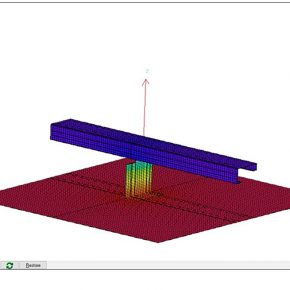
GUEST ARTICLE: Responding to COVID-19 – 10 positive changes implemented within the construction industry
JB Associates, a leading construction consultancy based in the South of England, has identified ten ways in which the construction industry has responded positively to the constraints of the coronavirus pandemic.
Faced with an array of challenges – from shut-down disruption and supply chain issues to social distancing and remote working – the construction industry has implemented the following 10 positive changes:
- Building Information Modelling for improved collaboration
Remote working has led to a greater reliance on Building Information Modelling (BIM) software. At JB Associates they have seen this as a crucial tool which facilitates seamless collaboration within construction and ensures swift problem-solving and efficient project delivery.
- Demand for interactive digital manuals
Managing facilities and mitigating risk remotely has led to a substantial drive toward interactive digital manuals, such as JB eDocs which can be accessed anytime, anywhere, and by an entire team simultaneously.
- An opportunity to diversify
While the need for retail and commercial office space could diminish, at least temporarily, it is anticipated that there will be high demand for new warehouses, data centres and manufacturing facilities in the post-COVID, post-Brexit era. As a one-stop construction consultancy, JB Associates can work closely alongside clients to provide bespoke support for a broad scope of future projects.
- Investment in construction innovation
Historically, construction is one of the least digitised industries but the pandemic has expedited a shift towards innovation in this sector. Tech investors are looking to streamline processes to boost operational efficiency, as well as implementing apps, drones, AI and VR.
- Increase in off-site manufacture
In the face of severe supplier disruption, procurement teams have relied on prefabricated components from off-site manufacturing plants where social distancing compliance is more easily implemented.
- Integrated flexible working
An array of platforms – from video conferencing to information-sharing and workflow apps – have been deployed to enable productive and connected remote working. This could mean the traditional 9-5 office job will become a thing of the past and more agile working will be adopted as the norm.
- Modular construction methods
In a bid to limit time onsite, demand for smart modular construction has risen sharply. Although not a new concept, the design for manufacture and assembly (DfMA) approach also results in less waste and lower carbon emissions.
- Boost to onsite health & safety
The increased hygiene measures required in response to the virus have introduced a need for better workplace and site housekeeping which will continue to boost health and safety, post-COVID.
- A bigger drive for sustainability
As advocates of energy efficient assets and facilities, JB Associates welcomes the move towards new design standards of sustainability in every aspect of construction. As the industry recovers from the pandemic, it is vital that sustainability and climate change remain at the heart of the built environment’s long-term plan.
- Renewed focus on data centre security
Data held in critical infrastructure environments has been under increased pressure over the last year (Microsoft ‘Digital Defense Report’, September 2020). JB Associates’ experts work with a number of leading global data centres to provide interactive HAZOP and risk management to protect these vital sites.
Ashley Buckland, Managing Director at JB Associates, commented: “As a result of the pandemic and the subsequent restrictions, it was essential that the construction industry adapted to new ways of working to ensure the safety of its workers.
“Without minimising the far-reaching negative impacts of COVID-19, our industry has seen some great advances as part of its response to these unprecedented challenges – possibly sooner than we might have expected, under normal circumstances.”
Latest news

26th July 2024
Enfield Speciality Doors completes world-class project for Atlas Copco HQ
A rundown office and warehouse building completely transformed into a modern headquarters for Atlas Copco has been fitted with more than 120 internal fire doors from Enfield Speciality Doors.
Posted in Access Control & Door Entry Systems, Articles, Building Industry News, Building Products & Structures, Building Systems, Case Studies, Doors, Interior Design & Construction, Interiors, Posts, Restoration & Refurbishment, Retrofit & Renovation, Security and Fire Protection, Sustainability & Energy Efficiency, Timber Buildings and Timber Products, Wooden products
26th July 2024
Abloy UK launches new white paper
Abloy UK, a leading provider of security and access control solutions, has launched a new white paper.
Posted in Access Control & Door Entry Systems, Architectural Ironmongery, Articles, Building Industry News, Building Products & Structures, Building Services, Doors, Facility Management & Building Services, Health & Safety, Information Technology, Innovations & New Products, Publications, Research & Materials Testing, Security and Fire Protection
26th July 2024
MCRMA Member Profile: David Roy, Director of Roofconsult
David Roy of MCRMA member company Roofconsult has more than 50 years’ experience to draw upon working in the building envelope sector and a unique perspective on how it has changed in that time.
Posted in Articles, BIM, Infrastructure & CAD Software, Building Associations & Institutes, Building Industry News, Building Products & Structures, Building Services, Building Systems, Cladding, Information Technology, Restoration & Refurbishment, Retrofit & Renovation, Roofs, Walls
26th July 2024
Strand: Enhancing Door Functionality and Safety
Craig Fox, Sales Director for Strand Hardware, outlines how door industry professionals might apply door limiting stays…
Posted in Architectural Ironmongery, Articles, Building Industry News, Building Products & Structures, Building Services, Doors, Facility Management & Building Services, Health & Safety, Restoration & Refurbishment, Retrofit & Renovation
 Sign up:
Sign up: